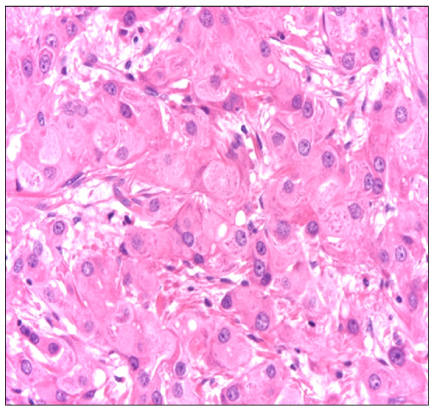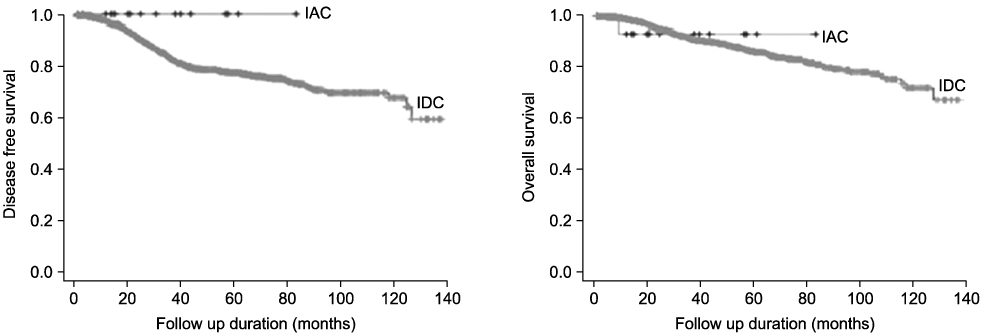J Korean Surg Soc.
2009 Jul;77(1):43-49. 10.4174/jkss.2009.77.1.43.
Clinicopathologic Characteristics of Apocrine Breast Carcinoma
- Affiliations
-
- 1Department of Surgery, National Health Insurance Corporation Ilsan Hospital, Goyang, Korea.
- 2Department of Surgery, Yonsei University College of Medicine, Seoul, Korea. bwpark@yuhs.ac
- 3Department of Pathology, Yonsei University College of Medicine, Seoul, Korea.
- KMID: 1464941
- DOI: http://doi.org/10.4174/jkss.2009.77.1.43
Abstract
-
PURPOSE: Apocrine carcinoma is a rare type of breast carcinoma, which has not been fully investigated. The aim of this study was to review clinicopathological features of apocrine carcinoma of the breast and to determine if there are some characteristics different from invasive ductal carcinoma.
METHODS
There were 4,064 breast cancer patients who had been managed in the Department of Surgery of Yonsei University College of Medicine from January 1997 to January 2008. Out of the patients, 16 patients with apocrine carcinoma and 2,997 patients with invasive ductal carcinoma were analyzed retrospectively.
RESULTS
The incidence of apocrine carcinoma was 0.4%. Most of the clinicopathologic features of apocrine carcinoma were similar to those of invasive ductal carcinoma. The percentage of estrogen receptor (ER) positivity and progesterone receptor (PR) positivity of apocrine carcinoma were all 12.5%. And the percentage of ER positivity and PR positivity of invasive ductal carcinoma were 64.2% and 55.2% respectively. Androgen receptor was only examined for eleven patients out of the 16 patients with apocrine carcinoma and the result were all positive.
CONCLUSION
Apocrine carcinoma is also a rare disease in Korea. When compared with invasive ductal carcinoma, the disease did not appear to show any other significant difference in clinicopathologic characteristics but the percentages of ER and PR positivity of apocrine carcinoma seemed lower than those of invasive ductal carcinoma.
MeSH Terms
Figure
Reference
-
1. Peters GN, Wolff M, Haagensen CD. Tubular carcinoma of the breast. Clinical pathologic correlations based on 100 cases. Ann Surg. 1981. 193:138–149.2. Ridolfi RL, Rosen PP, Port A, Kinne D, Mike V. Medullary carcinoma of the breast: a clinicopathologic study with 10 year follow-up. Cancer. 1977. 40:1365–1385.3. Di Saverio S, Gutierrez J, Avisar E. A retrospective review with long term follow up of 11,400 cases of pure mucinous breast carcinoma. Breast Cancer Res Treat. 2008. 111:541–547.4. Mossler JA, Barton TK, Brinkhous AD, McCarty KS, Moylan JA, McCarty KS Jr. Apocrine differentiation in human mammary carcinoma. Cancer. 1980. 46:2463–2471.5. Bonser GM. Human and Experimental Breast Cancer. 1961. London: Pitman.6. Haagensen CD, Bodian C, Haagensen DE Jr. Breast Carcinoma-Risk and Detection. 1981. Philadelphia: Saunders.7. d'Amore ES, Terrier-Lacombe MJ, Travagli JP, Friedman S, Contesso G. Invasive apocrine carcinoma of the breast: a long term follow-up study of 34 cases. Breast Cancer Res Treat. 1988. 12:37–44.8. Takeuchi H, Tsuji K, Ueo H, Kano T, Maehara Y. Clinicopathological feature and long-term prognosis of apocrine carcinoma of the breast in Japanese women. Breast Cancer Res Treat. 2004. 88:49–54.9. Tanaka K, Imoto S, Wada N, Sakemura N, Hasebe K. Invasive apocrine carcinoma of the breast: clinicopathologic features of 57 patients. Breast J. 2008. 14:164–168.10. Abati AD, Kimmel M, Rosen PP. Apocrine mammary carcinoma. A clinicopathologic study of 72 cases. Am J Clin Pathol. 1990. 94:371–377.11. Japaze H, Emina J, Diaz C, Schwam RJ, Gercovich N, Demonty G, et al. 'Pure' invasive apocrine carcinoma of the breast: a new clinicopathological entity? Breast. 2005. 14:3–10.12. Kim YB, Jung WH, Park CI. Apocrine carcinoma of the breast: report of two cases. Korean J Pathol. 1986. 20:240–242.13. Shin YD, Ko YG, Park HC, Koh SH, Yoon C. Three cases of apocrine carcinoma. J Korean Surg Soc. 1996. 50:602–607.14. Jung KH, Lee ES, Bae JW, Koo BH. Apocrine carcinoma of the breast: the report of 2 cases. J Korean Surg Soc. 1997. 52:755–759.15. Wells CA, El-Ayat GA. Non-operative breast pathology: apocrine lesions. J Clin Pathol. 2007. 60:1313–1320.16. Rosen PP. Rosen's Breast Pathology. 2001. 2nd ed. Philadelphia: Lippincott Williams & Wilkins.17. Eusebi V, Millis RR, Cattani MG, Bussolati G, Azzopardi JG. Apocrine carcinoma of the breast. A morphologic and immunocytochemical study. Am J Pathol. 1986. 123:532–541.18. Honma N, Takubo K, Akiyama F, Sawabe M, Arai T, Younes M, et al. Expression of GCDFP-15 and AR decreases in larger or node-positive apocrine carcinomas of the breast. Histopathology. 2005. 47:195–201.19. Gilles R, Lesnik A, Guinebretiere JM, Tardivon A, Masselot J, Contesso G, et al. Apocrine carcinoma: clinical and mammographic features. Radiology. 1994. 190:495–497.20. Piper GL, Patel NA, Patel JA, Malay MB, Julian TB. Neoadjuvant chemotherapy for locally advanced breast cancer results in alterations in preoperative tumor marker status. Am Surg. 2004. 70:1103–1106.21. Lee SH, Chung MA, Quddus MR, Steinhoff MM, Cady B. The effect of neoadjuvant chemotherapy on estrogen and progesterone receptor expression and hormone receptor status in breast cancer. Am J Surg. 2003. 186:348–350.22. Kaya H, Bozkurt SU, Erbarut I, Djamgoz MB. Apocrine carcinomas of the breast in Turkish women: hormone receptors, c-erbB-2 and p53 immunoexpression. Pathol Res Pract. 2008. 204:367–371.23. Moinfar F, Okcu M, Tsybrovskyy O, Regitnig P, Lax SF, Weybora W, et al. Androgen receptors frequently are expressed in breast carcinomas: potential relevance to new therapeutic strategies. Cancer. 2003. 98:703–711.
- Full Text Links
- Actions
-
Cited
- CITED
-
- Close
- Share
- Similar articles
-
- Apocrine Carcinoma of the Breast: The report of 2 cases
- Apocrine Carcinoma of the Breast: Report of two cases
- Apocrine Gland Carcinoma
- Apocrine Ductal Carcinoma In Situ of the Breast Presented Mass with Morphological Change on Follow-Up Ultrasound: A Report of Case
- Apocrine Carcinoma of the Breast: Clinicopathologic Analysis of 19 Cases



